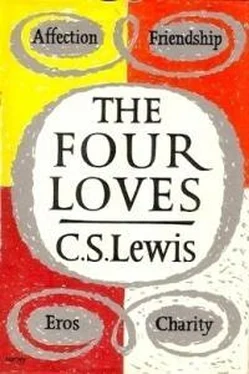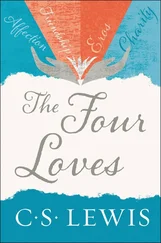The homosexual theory therefore seems to me not even plausible. This is not to say that Friendship and abnormal Eros have never been combined. Certain cultures at certain periods seem to have tended to the contamination. In war–like societies it was, I think, especially likely to creep into the relation between the mature Brave and his young armour–bearer or squire. The absence of the women while you were on the warpath had no doubt something to do with it. In deciding, if we think we need or can decide, where it crept in and where it did not, we must surely be guided by the evidence (when there is any) and not by an a priori theory. Kisses, tears and embraces are not in themselves evidence of homosexuality. The implications would be, if nothing else, too comic. Hrothgar embracing Beowulf, Johnson embracing Boswell (a pretty flagrantly heterosexual couple) and all those hairy old toughs of centurions in Tacitus, clinging to one another and begging for last kisses when the legion was broken up … all pansies? If you can believe that you can believe anything. On a broad historical view it is, of course, not the demonstrative gestures of Friendship among our ancestors but the absence of such gestures in our own society that calls for some special explanation. We, not they, are out of step.
I have said that Friendship is the least biological of our loves. Both the individual and the community can survive without it. But there is something else, often confused with Friendship, which the community does need; something which, though not Friendship, is the matrix of Friendship.
In early communities the co–operation of the males as hunters or fighters was no less necessary than the begetting and rearing of children. A tribe where there was no taste for the one would die no less surely than a tribe where there was no taste for the other. Long before history began we men have got together apart from the women and done things. We had to. And to like doing what must be done is a characteristic that has survival value. We not only had to do the things, we had to talk about them. We had to plan the hunt and the battle. When they were over we had to hold a post mortem and draw conclusions for future use. We liked this even better. We ridiculed or punished the cowards and bunglers, we praised the star–performers. We revelled in technicalities. ("He might have known he'd never get near the brute, not with the wind that way" … "You see, I had a lighter arrowhead; that's what did it" … "What I always say is―" … "stuck him just like that, see? Just the way I'm holding this stick" … ). In fact, we talked shop. We enjoyed one another's society greatly: we Braves, we hunters, all bound together by shared skill, shared dangers and hardships, esoteric jokes—away from the women and children. As some wag has said, palaeolithic man may or may not have had a club on his shoulder but he certainly had a club of the other sort. It was probably part of his religion; like that sacred smoking–club where the savages in Melville's Typee were "famously snug" every evening of their lives.
What were the women doing meanwhile? How should I know? I am a man and never spied on the mysteries of the Bona Dea. They certainly often had rituals from which men were excluded. When, as sometimes happened, agriculture was in their hands, they must, like the men, have had common skills, toils and triumphs. Yet perhaps their world was never as emphatically feminine as that of their men–folk was masculine. The children were with them; perhaps the old men were there too. But I am only guessing. I can trace the pre–history of Friendship only in the male line.
This pleasure in co–operation, in talking shop, in the mutual respect and understanding of men who daily see one another tested, is biologically valuable. You may, if you like, regard it as a product of the "gregarious instinct". To me that seems a round–about way of getting at something which we all understand far better already than anyone has ever understood the word instinct —something which is going on at this moment in dozens of ward–rooms, bar–rooms, common–rooms, messes and golf–clubs. I prefer to call it Companionship—or Clubbableness.
This Companionship is, however, only the matrix of Friendship. It is often called Friendship, and many people when they speak of their "friends" mean only their companions. But it is not Friendship in the sense I give to the word. By saying this I do not at all intend to disparage the merely Clubbable relation. We do not disparage silver by distinguishing it from gold.
Friendship arises out of mere Companionship when two or more of the companions discover that they have in common some insight or interest or even taste which the others do not share and which, till that moment, each believed to be his own unique treasure (or burden). The typical expression of opening Friendship would be something like, "What? You too? I thought I was the only one." We can imagine that among those early hunters and warriors single individuals—one in a century? one in a thousand years?—saw what others did not; saw that the deer was beautiful as well as edible, that hunting was fun as well as necessary, dreamed that his gods might be not only powerful but holy. But as long as each of these percipient persons dies without finding a kindred soul, nothing (I suspect) will come of it; art or sport or spiritual religion will not be born. It is when two such persons discover one another, when, whether with immense difficulties and semi–articulate fumblings or with what would seem to us amazing and elliptical speed, they share their vision—it is then that Friendship is born. And instantly they stand together in an immense solitude.
Lovers seek for privacy. Friends find this solitude about them, this barrier between them and the herd, whether they want it or not. They would be glad to reduce it. The first two would be glad to find a third.
In our own time Friendship arises in the same way. For us of course the shared activity and therefore the companionship on which Friendship supervenes will not often be a bodily one like hunting or fighting. It may be a common religion, common studies, a common profession, even a common recreation. All who share it will be our companions; but one or two or three who share something more will be our Friends. In this kind of love, as Emerson said, Do you love me? means Do you see the same truth? —Or at least, "Do you care about the same truth?" The man who agrees with us that some question, little regarded by others, is of great importance, can be our Friend. He need not agree with us about the answer.
Notice that Friendship thus repeats on a more individual and less socially necessary level the character of the Companionship which was its matrix. The Companionship was between people who were doing something together—hunting, studying, painting or what you will. The Friends will still be doing something together, but something more inward, less widely shared and less easily defined; still hunters, but of some immaterial quarry; still collaborating, but in some work the world does not, or not yet, take account of; still travelling companions, but on a different kind of journey. Hence we picture lovers face to face but Friends side by side; their eyes look ahead.
That is why those pathetic people who simply "want friends" can never make any. The very condition of having Friends is that we should want something else besides Friends. Where the truthful answer to the question Do you see the same truth? would be "I see nothing and I don't care about the truth; I only want a Friend", no Friendship can arise—though Affection of course may. There would be nothing for the Friendship to be about ; and Friendship must be about something, even if it were only an enthusiasm for dominoes or white mice. Those who have nothing can share nothing; those who are going nowhere can have no fellow–travellers.
Читать дальше











